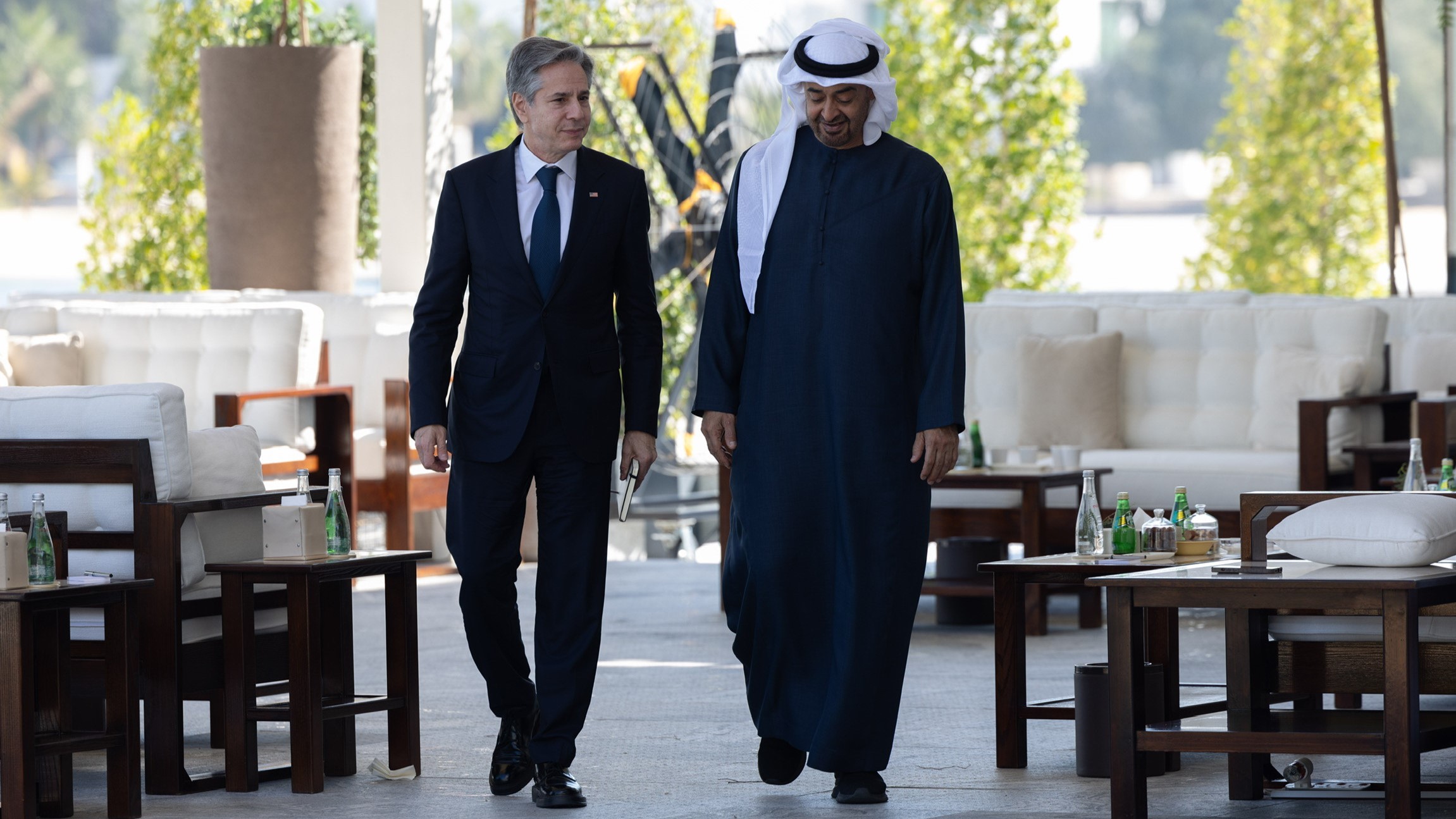US Secretary of State Antony Blinken visited the UAE and Saudi Arabia on Monday, January 8, as part of his latest attempt to calm the rising tensions in the region due to Israel’s three-month long war against Palestinians in Gaza. As the US government, Israel’s primary political and financial backer, remains unwilling to support a ceasefire, his visit offers no hope for peace. This is Blinken’s fourth visit to the region since Israel began its genocidal war on Gaza.
He kicked off his tour on Saturday with a visit to Turkey and Greece. On Sunday, Blinken visited Jordan and Qatar. He is expected to visit Israel on Tuesday.
The US Department of State issued a brief statement stating that the purpose of Blinken’s visit was to “discuss urgent mechanisms to stem violence, calm rhetoric and reduce regional tensions, including deterring Houthi attacks on commercial shipping in the Red Sea and avoiding escalation in Lebanon.”
In a meeting with the President of the UAE, Mohamed Bin Zayed in Abu Dhabi, Blinken reiterated US support for a two-state solution to Palestine. However, there were no assurances given on the long standing demand for an immediate ceasefire in Gaza.
“This is a moment of profound tension for the region. This is a conflict that could easily metastasize, causing even more insecurity and suffering,” Blinken had said before leaving Qatar for Abu Dhabi.
In the last few months, despite attempts by the US to contain the war in Gaza, several regional players such as Yemen’s Ansar Allah or the Houthis, the Islamic Resistance in Iraq, and Hezbollah in Lebanon, have intervened in support of Palestinian resistance, challenging the passive response of most of the world community.
Growing regional escalation
One of the primary concerns for Israel and the United States is a possible escalation in the fighting between Israel and its northern neighbor Hezbollah. Hezbollah has carried out attacks against Israel and Israeli military installations since October 8 in support of Palestine, while Israel has launched airstrikes across Southern Lebanon. Over 20 Lebanese civilians and over 140 Hezbollah fighters have been killed in repeated Israeli bombings inside Lebanon. Israel targeted and assassinated senior Hamas leader Saleh al-Arouri on January 2 in Beirut as well.
In response, Hezbollah has increased their missile strikes inside Israel, killing some Israeli soldiers and destroying substantial military infrastructure. Hezbollah Secretary General Hassan Nasrallah has repeatedly warned of dire consequences if Israel continues to attack Lebanon and drag it into the war.
When Blinken was touring the UAE and Saudi Arabia on Monday, another Israeli strike inside southern Lebanon killed a senior Hezbollah leader, AP reported.
On Monday, Al-Mayadeen also reported that an umbrella group in Iraq called the Islamic Resistance, mostly made up of the constituents of the Popular Mobilization Forces (PMF), a semi-official militia, claimed that they targeted Israel’s port city Haifa with a long range al-Arqab cruise missile. The group also claimed that they previously targeted the Golan Heights and stated they have the capacity to target all Israeli cities if necessary.
Hussain al-Moussawi, one of the spokespersons of the al-Nujaba movement, told Al-Mayadeen that the group has capacity to attack targets beyond Haifa and that those attacks will continue until the war on Gaza ends.
The group has claimed responsibility for numerous attacks on the US bases in Iraq and Syria since the beginning of the war in Gaza. The group claims the attacks on the Israeli targets and on the US bases are in “support of our people in Gaza and in response to massacres committed by the usurping entity against Palestinian civilians, including children, women and the elderly.”
Nearly 23,000 Palestinians have been killed, and of those 70% of them are children, women and elderly. Over 58,000 others have been injured since Israel started its current war in Gaza on October 7.
The Houthis in Yemen have also refused to cease their attacks on the ships moving towards Israel in the Red Sea despite the US announcing a global coalition under the so-called Operation Prosperity Guardian. On Sunday, Blinken reiterated the warning against Houthis.
Blinken fails to win Arab trust
Blinken responded to the concerns raised by Jordan, Qatar and other Arab countries about Israel’s attempts to forcibly displaced Palestinians in Gaza by saying that his country is opposed to any such move and “Palestinian civilians must be able to return home as soon as conditions allow.”
Over 80% of Gaza’s 2.3 million population has been displaced due to Israeli air strikes and land incursions since October 7. Israel has forcefully evacuated people from their homes and destroyed most of the residential areas and civic amenities in most of Gaza.
Despite US assurances, several Israeli officials have repeatedly asked Palestinians in Gaza to leave the territory. Certain officials have even hinted at building illegal Israeli settlements in Gaza after the end of the war.
As long as the US continues to block all international efforts to call for a ceasefire and continues to bankroll Israel’s murderous military actions in Gaza, declarations by US officials calling for de-escalation and protection of civilian lives are seen as empty words.





